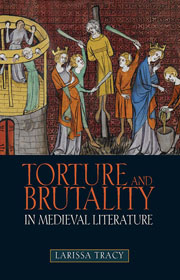Book contents
- Frontmatter
- Contents
- Acknowledgements
- Abbreviations
- Introduction
- 1 Rending the Flesh: The Orthodoxy of Torture in Hagiography
- 2 Resisting the Rod: Torture and the Anxieties of Continental Identity
- 3 The Matter of the North: Icelandic Sagas and Cultural Antonomy
- 4 The Matter of Britain: Defining English Identity in Opposition to Torture
- 5 Laughing at Pain: The Comic Uses of Torture and Brutality
- 6 Medieval Torture and Early-Modern Identity
- Conclusion
- Select Bibliography
- Index
3 - The Matter of the North: Icelandic Sagas and Cultural Antonomy
Published online by Cambridge University Press: 05 September 2013
- Frontmatter
- Contents
- Acknowledgements
- Abbreviations
- Introduction
- 1 Rending the Flesh: The Orthodoxy of Torture in Hagiography
- 2 Resisting the Rod: Torture and the Anxieties of Continental Identity
- 3 The Matter of the North: Icelandic Sagas and Cultural Antonomy
- 4 The Matter of Britain: Defining English Identity in Opposition to Torture
- 5 Laughing at Pain: The Comic Uses of Torture and Brutality
- 6 Medieval Torture and Early-Modern Identity
- Conclusion
- Select Bibliography
- Index
Summary
In which justice is meted out, and there is the embarrassing impression that everyone is wrong
The Name of the Rose, Umberto Eco (p. 445)While continental societies struggled to establish their place in the shadow of the growing powers of France and England and continuing dynastic disputes, Scandinavia was engaged in a similar discourse on identity. Icelandic saga authors attempted to define themselves in opposition to both Norwegian encroachment and a Viking past notable for savage atrocities. There was an ‘extraordinary explosion of Icelandic literature in the twelfth, thirteenth and fourteenth centuries’ when three distinct saga genres were composed, connecting the culture of Iceland to its own heritage and to the shared traditions with medieval western Europe. The legendary sagas (fornaldarsögur), chivalric or ‘knights’ sagas (riddarasögur), and Icelandic family sagas (Íslendingasaga) situate Iceland and its heroes within a complex literary culture of identity. Riddarasögur arise ‘from the traffic in translations of foreign literature’, while fornaldarsögur ‘adapt a tradition, indigenous and intimately linked to the image that Icelanders of the twelfth and thirteenth centuries formed of their own past, to a new form: fictional prose narrative’. The Íslendingasaga is tied to ‘the past of its authors and audience, but to a much more recent past’. Anxieties about the earlier and more recent past are articulated in saga accounts of excessive judicial brutality that contravene acceptable modes of social governance. The Old Norse/Icelandic sagas resist the influence of outside forces in favour of native sentiment and genre.
- Type
- Chapter
- Information
- Torture and Brutality in Medieval LiteratureNegotiations of National Identity, pp. 108 - 131Publisher: Boydell & BrewerPrint publication year: 2012



